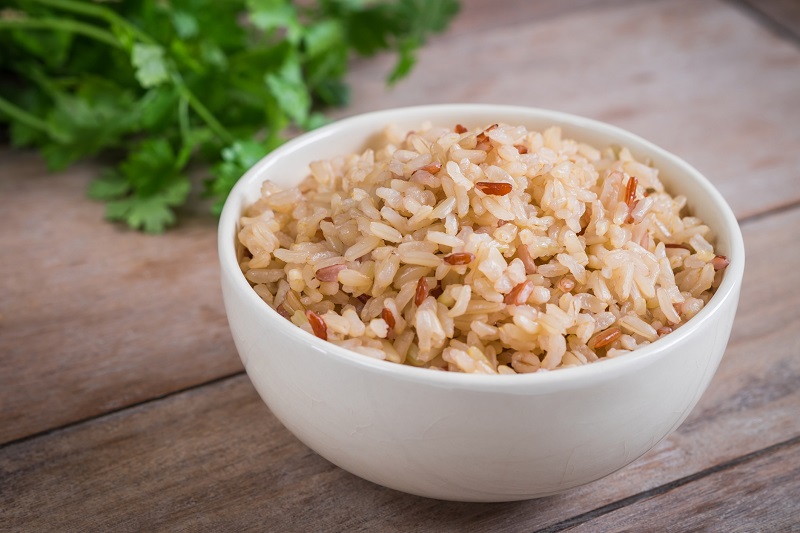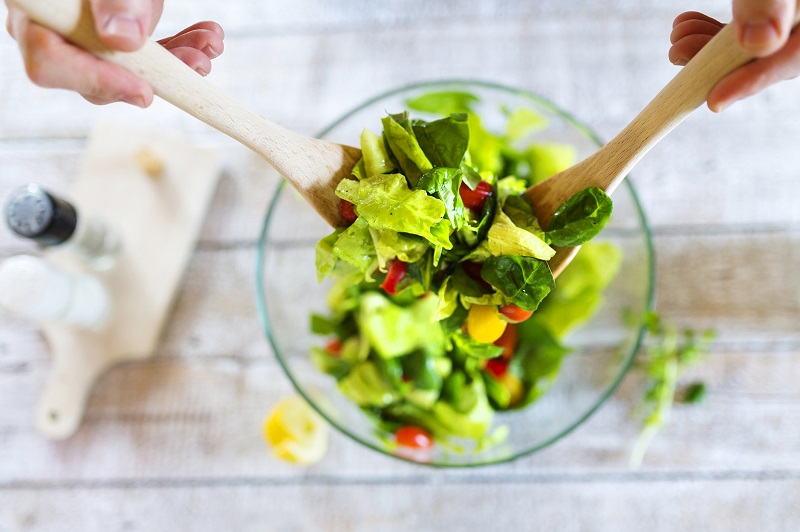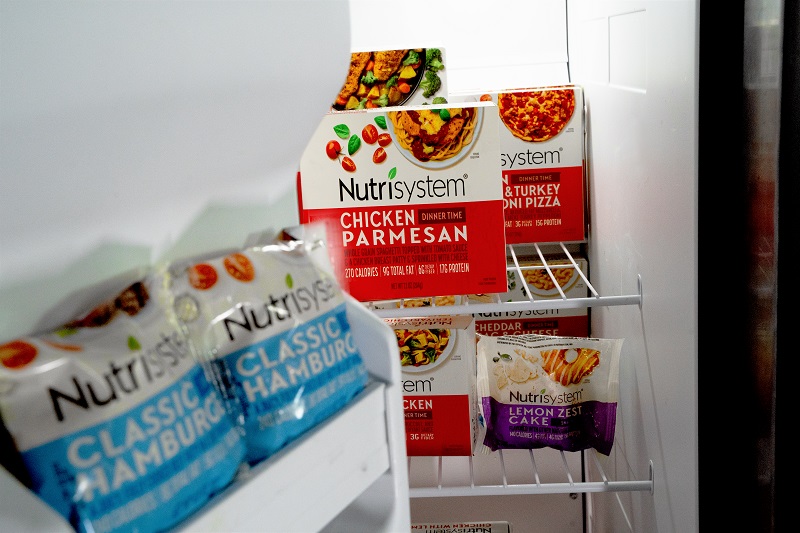Have you ever spent your precious weekend hours meal planning and grocery shopping for healthy meals, only to get home exhausted and order takeout? Or maybe you’ve been so overwhelmed about where to start in the kitchen that you keep pushing off your health goals and feel stuck?
You’ve probably heard that the only healthy way to lose weight is to home-cook all your meals from whole foods and avoid anything in a package. However, this is not accurate or practical for most people. Instead, this unattainable ideal can actually set you up for failure and leave you feeling burnt out.
Consider that the average person spends 37 minutes per day on food prep. Diets that require hours of cooking are simply not sustainable for the typical adult’s busy schedule.
But here’s the good news: plenty of convenience foods are just as healthy as freshly-prepared whole foods, and they can help you reach your weight loss goals without feeling burnt out in the kitchen.
Get ready to say goodbye to the food perfectionist mindset with the following dietitian-approved cooking shortcuts that make healthy eating easy and enjoyable.
Stock Up on Easy Proteins

Forgot to defrost chicken breast? No time to marinate? No problem! Plenty of quick and easy protein options are just as healthy as grilled chicken.
- Canned Beans – Super filling and high in protein and fiber, canned beans are both convenient and nutritious. Choose lower sodium options and thoroughly rinse them, which reduces sodium by about another 41%. Add them to salads, pasta dishes or burritos.
- Rotisserie Chicken – For just a few bucks, the average rotisserie chicken will give you three cups of ready-to-eat protein. Remove the skin, and a three-ounce portion of mixed light and dark meat will provide about 135 calories and 23 grams of protein – nearly the same nutrition as plain chicken breast without all the prep.
- Store-Bought Hard-Boiled Eggs – Providing six grams of protein each, hard boiled eggs make a great snack and are perfect for whipping up a quick egg salad. Opt for preservative-free brands, and you’ll get the same nutrition as if you’d made them yourself, without spending the 20 minutes doing it.
- Protein Bars – Don’t have time to make homemade energy bites (who does)? Protein bars paired with fruit make a great breakfast on the go. Having one in your bag can also help you avoid the vending machine when afternoon hunger strikes. Look for options under 200 calories with at least 10 grams of protein and minimal artificial flavors, sweeteners and preservatives.
Buy Frozen Vegetables and Fruits

Sick of throwing out produce that you didn’t have the time or energy to prepare? Stock up on frozen fruits and vegetables.
Not only are they super convenient (i.e., already prepped and cut), but they are just as nutritious as their fresh counterparts. Frozen at their peak of freshness, they can even provide better quality than fresh produce, which is bumped and bruised during shipping.
Plus, research has shown that cooking frozen vegetables in steamable microwave bags retains essential nutrients like vitamin C and antioxidants.
Check the labels and choose plain frozen fruits and vegetables without added sauces, syrup, or seasonings. Then use them:
- Steamed, stir-fried or roasted as a side dish.
- Blended into smoothies.
- Mixed into overnight oats.
- Added to soups or stews.
Use Quick Cooking Grains

Swapping refined grains for whole grains is one of the best things you can do to boost weight loss and improve your overall health.
The fiber and nutrients in whole grain foods protect your heart and gut health. Fiber-rich foods also travel slowly through your digestive system, keeping you feeling full so you naturally eat fewer calories throughout the day.
However, when it takes close to an hour to cook whole grains like brown rice, this can be easier said than done.
The good news is that microwavable brown and wild rice can be just as healthy as traditional rice options. While minute rice is partially pre-cooked before packaging, it retains all three parts of the whole grain and their nutrients.
Plus, unlike quick-cooking oats, this pre-cooking step doesn’t impact the glycemic index of minute rice, so it’s still a good choice for keeping blood sugars steady throughout the day.
Choose plain brown rice or wild rice without extra seasonings to keep sodium in check. Other quick-cooking whole grains include:
- Quinoa
- Whole Grain Couscous
- Bulgar
- Barley
Build a Meal from Bagged Salad Mix

Spare yourself from buying and chopping multiple ingredients to meal prep salads by grabbing a few bagged salad mixes.
Divide each bag into three to four portions, then add a few simple extra ingredients to make them meal-worthy. Here are some favorite combinations:
- Add avocado and black beans to a southwest salad mix.
- Add rotisserie chicken and mandarin orange slices to an Asian salad mix.
- Add quinoa and hard-boiled eggs to a light Caesar salad mix.
- Add hummus, cherry tomatoes and feta cheese to a spring mix.
Based on your calorie goals, you can portion out the included salad dressing or toss it and use your preferred dressing.
Incorporate Pre-Made Meals

Studies have consistently shown that following a structured plan, including portion-controlled meal replacement products, improves weight loss success, particularly in the first six months of making dietary changes.
These products help simplify food choices and make it easier to assess calorie and nutrient intake accurately.
Incorporating healthier frozen entrees or meal replacement shakes into a balanced plan is an easy way to build momentum toward your goals.
This practice is the basis of the Nutrisystem approach to weight loss. Nutrisystem weight loss plans are based on the nutrient exchange system and provide structured meal plans that allow you to use your own foods in combination with convenient pre-made meals.
Nutrisystem foods are made with minimal preservatives and no artificial flavors or sweeteners. All of the Nutrisystem programs are designed to align with the USDA’s recommended daily intake of 2,300 mg of sodium or less for the general adult population (Dietary Guidelines for Americans, 2020 – 2025). The actual sodium level may vary based on which weight loss program you choose and which grocery food items you add to your diet plan.
Multiple plan options allow you to choose how many Nutrisystem foods you use. As you get the hang of the program, you can even transition to using more of your own foods, using the NuMi app to help you stay on track.
Key Takeaway
You don’t need to get overwhelmed trying to create the perfect home-cooked, whole food diet plan to achieve your goals. Plenty of convenience foods are perfectly healthy.
When incorporated into a balanced plan, meal replacement products like those available through the Nutrisystem programs can be an effective way to get started.
The best way to learn is by doing, so find options that will realistically help you take a first step – even if it’s a small step. These small changes will add up over time to something big.
References
- Hamrick S., Karen and McClelland, Ket. Americans’ Eating Patterns and Time Spent on Food: The 2014 Eating & Health Module Data, EIB-158, U.S. Department of Agriculture, Economic Research Service, July 2016.
- Duyff R, et al. Sodium Reduction in Canned Beans After Draining, Rinsing. J. Culin. Sci. Technol. 2011;9:106 -112.
- Zhong X, Dolan K, Almenar E. Effect of steamable bag microwaving versus traditional cooking methods on nutritional preservation and physical properties of frozen vegetables: A case study on broccoli (Brassica oleracea). IFSET. 2015;31: 116-122.
- Howarth NC, Saltzman E, Roberts SB. Dietary fiber and weight regulation. Nutr Rev. 2001;59(5):129-139.
- Look AHEAD Research Group, Wadden TA, West DS, et al. The Look AHEAD study: a description of the lifestyle intervention and the evidence supporting it [published correction appears in Obesity (Silver Spring). 2007 May;15(5):1339.
The post Feeling Burnt Out in the Kitchen? How to Lose Weight Without Home-Cooking Every Meal appeared first on The Leaf.
from The Leaf https://ift.tt/AgLwHYp




